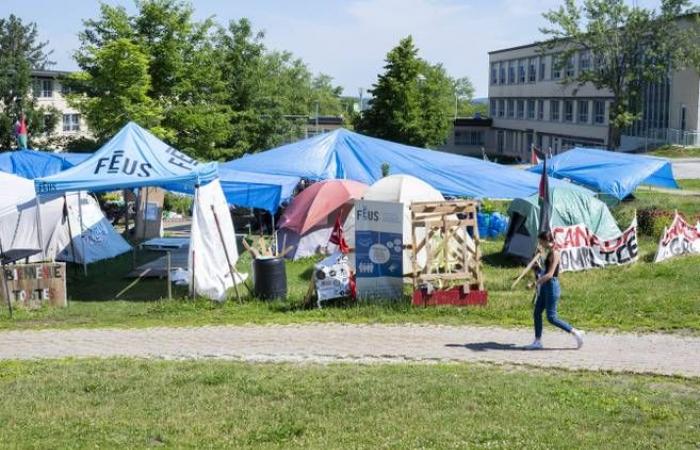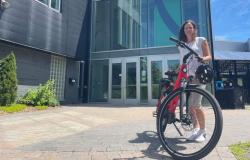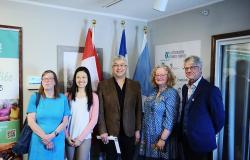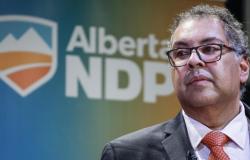For almost two months, the pro-Palestinian camp at UdeS has been growing below the offices of the rectorate of the establishment. It is at this location that The gallery met Pierre Cossette, who gave his first interview devoted to the camp since its installation.
“For someone who just looks at the camp, you might think that there have been more and more people for the past six weeks, but we see the same number of people all the time,” notes Rector Cossette.
Following these observations, the University is asking the camp to comply with a list of renewed rules on Tuesday, which includes a reduction in its perimeter, the removal of tarps or dangerous heating devices and the cessation of the use of UdeS furniture for the camp, for example.
“They’re going to have to take a proportion that’s reasonable. We, the people who commit to a cause, we respect that. We respect it so much that we lent them concrete blocks and helped them install their stuff, but the social pact is a bit broken at the moment, because there’s no real openness on their part,” thunders the rector.
However, there will be no dismantling of the police force in the short term, he hastens to add. “We have no intention of going to court” to obtain an injunction, assures Professor Cossette.
Pierre Cossette, rector of the UdeS, says he is “impatient” to see the pro-Palestinian camp cease its activities. (Maxime Picard/La Tribune)
“Unless there are other events,” he said, referring to the acts of vandalism that the university accuses members of the encampment of having committed.
In other universities in Quebec, the courts were approached very quickly. McGill, for example, filed numerous injunction requests to dismantle the camp on its campus in May, without success. At UQAM, a partial dismantling was authorized at the end of May.
At Laval University, a camp was dismantled by the police at the beginning of June, without the intervention of the court.
The pro-Palestinian camp at UdeS has grown, but the number of people there remains limited, according to the rector. (Maxime Picard/La Tribune)
Denunciation?
Recalling that the UdeS recently made 14 commitments on actions it can take to help the situation in Palestine, Pierre Cossette believes that the institution has already offered much more to the demonstrators than in other universities where the camps were lifted without the use of force.
For example, he talks about the assistance provided to Palestinian students or professors who would like to come to the UdeS, specifying however that these files are ultimately the responsibility of Immigration Canada or the awareness raised with the Fondation de l’Université de Sherbrooke, independent of the UdeS, so that its placements are as ethical as possible.
The rector also considers the camp’s negative response to these concessions by the University to be “very disappointing”.
Pierre Cossette believes that the University made many concessions to the protesters. (Maxime Picard/La Tribune)
Professor Cossette nevertheless refuses to allow the University to take a position against investments by the federal and provincial governments or on the presence or absence of a genocide in Palestine, as requested by the members of the encampment. This is one of the points that is causing the negotiations to stumble, the encampment’s spokespersons said a few weeks ago.
“It’s not our role to do that. […] “I’m certainly not going to denounce a government. As a university, we denounce violence. As a citizen of the world and as a collection of citizens, at the leadership level, we also consider it important that there be a ceasefire,” he says.
Recalling that this is a “disastrous conflict”, Pierre Cossette nevertheless judges that “the University does not approve of governments and does not disapprove of them either”.
“The University is not a political organization. There are hundreds of causes supported by members of our community, I can’t begin to support or disapprove of them one by one,” he said.
The members of the camp would like in particular for the UdeS to recognize that the actions of Benjamin Netanyahu’s government amount to genocide. (Maxime Picard/La Tribune)
The camp reacts
On the pro-Palestinian camp, the new rules imposed by the UdeS have the effect of a “disguised dismantling”, underlines co-spokesperson Assya Si Ali.
“We strongly oppose the UdeS’s demands. Our tarps protect us from the rain and the heat. So it becomes a security issue for us. Many of the demands they have of us affect our security,” she says.
The requested reduction in perimeter, she said, would affect “two-thirds” of the camp.
Assya Si Ali, co-spokesperson for the camp, assures that the members will not comply with the UdeS’s demands. (Jean Roy/La Tribune Archives)
The other co-spokesperson, Manu Roche-Pilotto, believes that the last public holidays had an impact on the number of people at the camp.
“What has been proposed to us so far as the University’s commitment is not very concrete for Palestine,” he adds.
For her part, Assya Si Ali believes that the members of the camp have shown a lot of compromise and that it is the UdeS which has a “closed” stance.
Representatives of the camp will hold a press briefing at 5 p.m. Tuesday. However, they confirmed to The gallery that they would not comply with the UdeS’s requirements. If this is the case, this will result in administrative sanctions against the students, explains Pierre Cossette.






